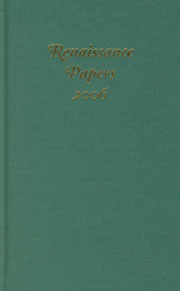Book contents
- Frontmatter
- Contents
- Renaissance Papers
- Youthes Witte: An Unstudied Elizabethan Anthology of Printed Verse and Prose Fiction
- The Power of Association: A Study in the Legitimization of Bianca Cappello through Medici Matriarchal Portraiture
- Vindicta and Vindiciae on the Early English Stage: Imagining Revenge through Huguenot Resistance Theory
- Breaking the Head of the Serpent: Women's Childbirth Prayers in The Monument of Matrones
- “Conquered nations mean nothing in love”: Political Dissent in Propertius's Elegy II.7 and Donne's “Love's Warre”
- Correcting Double Vision in The Comedy of Errors
- Lear's Awakening: Texts and Contexts
- The Power of Fantasy in Middleton's Chaste Maid: A Cost/Benefit Analysis
- Invariant Paratexts in English Dramatic Texts
- Milton and Forgiveness
- Samson at the Fair
- The End of Samson Agonistes
Vindicta and Vindiciae on the Early English Stage: Imagining Revenge through Huguenot Resistance Theory
Published online by Cambridge University Press: 12 September 2012
- Frontmatter
- Contents
- Renaissance Papers
- Youthes Witte: An Unstudied Elizabethan Anthology of Printed Verse and Prose Fiction
- The Power of Association: A Study in the Legitimization of Bianca Cappello through Medici Matriarchal Portraiture
- Vindicta and Vindiciae on the Early English Stage: Imagining Revenge through Huguenot Resistance Theory
- Breaking the Head of the Serpent: Women's Childbirth Prayers in The Monument of Matrones
- “Conquered nations mean nothing in love”: Political Dissent in Propertius's Elegy II.7 and Donne's “Love's Warre”
- Correcting Double Vision in The Comedy of Errors
- Lear's Awakening: Texts and Contexts
- The Power of Fantasy in Middleton's Chaste Maid: A Cost/Benefit Analysis
- Invariant Paratexts in English Dramatic Texts
- Milton and Forgiveness
- Samson at the Fair
- The End of Samson Agonistes
Summary
IN the final act of Marston's Antonio's Revenge (1600), just as Antonio and his Venetian co-conspirators move to avenge themselves against Piero, the tyrannical Duke of Venice, we are told that “the Florence prince; / Drawn by firm notice of the duke's black deeds, / Is made a partner in conspiracy” (V.i.14–16). It is a curious moment. The assistance of Galeazzo, Duke of Florence, is certainly not needed. Many able forces are already arrayed against Piero, and Galeazzo does not play a significant role in his assassination. Why then does Marston pause to assure us of the Florentine ruler's complicity? It is a move that no doubt further legitimates the play's claim that Piero is a tyrant and that tyrannicide is an appropriate response. But the portrayal of “outside assistance” also links the play to recent articulations of political resistance put forth by the French Huguenots. In justifying resistance to tyranny, the anonymous Vindiciae Contra Tyrannos (1579) asserts that “neighboring princes may by right, or ought, to render assistance to subjects of other princes who are being … oppressed by manifest tyranny.” In 1570s France, this claim was really a plea for other Protestant states to aide the Huguenots in their struggle against the Catholic establishment. Marston's use of this “outside assistance” principle to imagine and justify Antonio's revenge attests to the transmission of Huguenot resistance theory into England—and suggests that it was being actively explored on the English stage.
- Type
- Chapter
- Information
- Renaissance Papers 2006 , pp. 43 - 60Publisher: Boydell & BrewerPrint publication year: 2007



